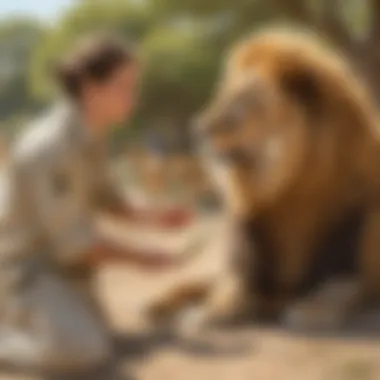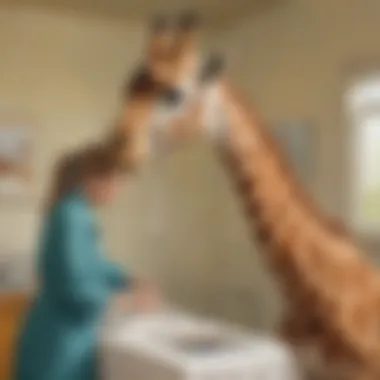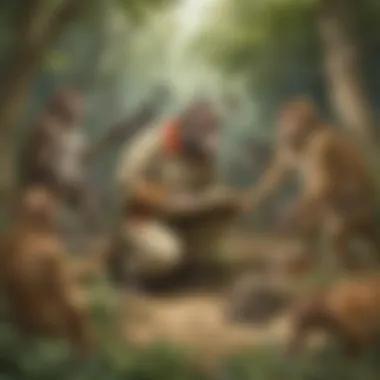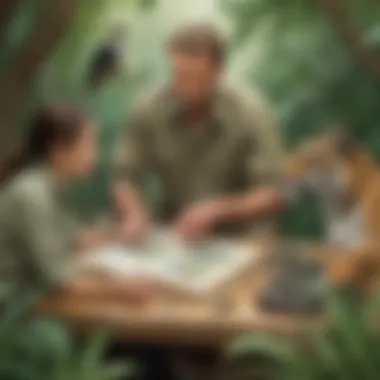Unveiling the Arduous Path to Zookeeper: Balancing Challenges and Rewards


Science Fun Facts
One intriguing aspect of the world of zookeeping is the diverse range of species that zookeepers care for, from majestic lions to colorful parrots. These dedicated individuals not only provide food and shelter but also ensure the well-being of these animals by creating enriching environments for them to thrive. You can sense the passion and commitment every time a zookeeper interacts with an animal, fostering a bond that goes beyond words - a truly heartwarming connection that touches the core of our existence.
Challenges of Becoming a Zookeeper
Embarking on the journey to become a zookeeper is not a smooth ride but rather a rollercoaster of challenges and obstacles. From rigorous educational requirements to demanding physical tasks, aspiring zookeepers must exhibit resilience and determination to navigate through the rough terrains of this career path. The unpredictability of working with animals, coupled with long working hours, can test even the most dedicated individual’s patience. Nevertheless, the prospect of making a difference in the lives of these magnificent creatures makes all the challenges worthwhile.
Rewards of Being a Zookeeper
For those who persevere and follow their passion for animals, the rewards of being a zookeeper are priceless. Witnessing the growth and development of the animals under their care brings immense joy and fulfillment to zookeepers. The moments of connection and understanding forged between keeper and animal are truly magical and leave a lasting impact on both parties. Moreover, educating the public about wildlife conservation and instilling a sense of respect for nature in visitors are integral aspects of a zookeeper's role, contributing significantly to the preservation of our planet's biodiversity.
Synthesizing the Journey
Introduction
In the world of zoology, the role of a zookeeper stands as a pivotal figure in the conservation and care of various animal species. Zookeepers serve as the primary caregivers for the animals inhabiting zoos, responsible for ensuring their well-being and creating a safe and enriching environment. The importance of understanding the challenges and rewards that come with this profession is crucial for anyone considering a career in zookeeping. By exploring the nuances of this role, individuals can grasp the level of dedication and passion required to thrive in such a unique and demanding field.
Defining the Role of a Zookeeper
Embarking on the journey to become a zookeeper demands a profound appreciation for animals and a keen sense of responsibility. Zookeepers are tasked with not only feeding and cleaning up after the animals but also with providing mental and physical stimulation to enhance their quality of life. Understanding the behavioral patterns, dietary needs, and social dynamics of different species is fundamental to offering the best possible care. Furthermore, zookeepers often engage in educational initiatives, imparting knowledge about wildlife and conservation to visitors.
Furthermore, the role of a zookeeper extends beyond routine tasks; it involves a deep commitment to the well-being of the animals under their care. Building strong relationships with the animals, observing their health closely, and being prepared to handle emergencies are all part of a zookeeper's daily duties. This blend of practical work, emotional connection, and educational outreach makes the role of a zookeeper multifaceted and uniquely rewarding.
Educational Background


Becoming a zookeeper entails a meticulous journey that requires a strong educational foundation. An individual aspiring to become a zookeeper must grasp the significant role of educational background in shaping their career path. Academic qualifications serve as the cornerstone for developing essential knowledge and skills in animal care, biology, and environmental science. Possessing a comprehensive educational background lays the groundwork for mastering the complexities of zookeeping and understanding the intricate relationships between different species and their environments. Prospective zookeepers must prioritize their studies in fields relevant to zoology, wildlife conservation, and animal behavior.
Academic Qualifications
To excel as a zookeeper, acquiring relevant academic qualifications is paramount. Pursuing degrees in zoology, biology, wildlife management, or a related field equips individuals with the necessary theoretical knowledge to thrive in this demanding profession. Courses focusing on animal physiology, nutrition, and behavioral patterns provide valuable insights into the diverse needs of wildlife species. Additionally, obtaining certifications in animal handling and first aid further enhances a zookeeper's credibility and competence. Practical experience gained through educational programs such as internships or hands-on training sessions complements academic qualifications, offering a holistic approach to preparing for the challenges of zookeeping. Success as a zookeeper significantly hinges on a solid educational background supported by practical application and a genuine passion for wildlife conservation.
Experience Requirements
Becoming a proficient zookeeper is no simple feat; it demands a unique blend of knowledge, skills, and hands-on experience. The segment focusing on experience requirements in this article sheds light on the pivotal role that practical training plays in preparing aspiring zookeepers for the challenges that lie ahead. Emphasizing the importance of experiential learning in a domain as intricate as zookeeping is paramount. Real-world exposure equips individuals with a deeper understanding of animal behavior, enclosure maintenance, and overall operational logistics integral to the role of a zookeeper.
Building a solid foundation through experience allows aspiring zookeepers to navigate the complexities of the job with finesse and confidence. Experience requirements serve as a bridge between theoretical knowledge and practical application, ensuring that zookeepers possess the necessary prowess to handle diverse scenarios within a zoo environment effectively.
Navigating the various facets of animal care, behavioral observation, and habitat management demands hands-on experience that only real-life exposure can provide. By immersing themselves in the daily tasks and challenges encountered in a zoo setting, aspiring zookeepers gain invaluable insights that textbooks alone cannot offer.
Hands-on Training
The realm of zookeeping thrives on the meticulous art of hands-on training. This integral aspect of preparing future zookeepers delves into the intricacies of direct interaction with a myriad of species. Hands-on training sessions immerse individuals in the practical aspects of animal care, emphasizing the importance of gentle handling, species-specific requirements, and safety protocols.
Through experiential learning, aspiring zookeepers develop the necessary muscle memory and reflexes to respond promptly to unforeseen circumstances within a zoo environment. From feeding routines to medical care procedures, hands-on training encapsulates the diverse skill set required to excel in the dynamic world of zookeeping.
Engagement with seasoned professionals during hands-on training sessions enhances the learning experience, providing invaluable mentorship and guidance along the journey to becoming a proficient zookeeper. Practical simulations and supervised interactions with animals form the cornerstone of hands-on training, offering aspiring zookeepers a holistic preparation for the multifaceted responsibilities that await them.
Internship Opportunities
Internship opportunities serve as invaluable gateways for aspiring zookeepers to gain firsthand experience and establish industry connections. This subsection explores the significant role that internships play in shaping the professional trajectory of individuals embarking on a zookeeping career.
Securing an internship not only provides practical exposure to the daily operations of a zoo but also fosters mentorship relationships with experienced professionals in the field. Interns have the unique opportunity to observe and participate in animal care activities, enclosure maintenance, and educational programs, honing their skills under the guidance of seasoned zookeepers.


Internship opportunities offer a conducive environment for aspiring zookeepers to apply theoretical knowledge in a practical setting, bridging the gap between academic learning and real-world application. The hands-on experience gained during internships equips individuals with invaluable insights, establishing a strong foundation for their future endeavors in the captivating realm of zookeeping.
Skill Set
To embark on the journey of becoming a zookeeper, one must cultivate a diverse skill set that encompasses various critical aspects vital for success in this demanding profession. The relevance of a skill set in the realm of zookeeping cannot be overstated. Zookeepers need a plethora of abilities ranging from animal care to communication skills. They must possess patience, empathy, keen observation skills, and a strong work ethic to tend to the diverse needs of the animals under their care. Interacting with animals requires a delicate balance of firmness and compassion, making a well-rounded skill set crucial.
In the realm of zookeeping, a robust skill set extends beyond animal interactions. It encompasses record-keeping, teamwork, problem-solving, and adaptability when faced with unexpected challenges. Effective communication skills are vital for zookeepers to liaise with colleagues, veterinarians, and the public.
Moreover, a zookeeper's skill set influences animal welfare and conservation efforts. Through their proficiency in creating enriching environments and implementing proper husbandry practices, zookeepers play a pivotal role in ensuring the well-being of the animals entrusted to their care. Recognizing the significance of developing and refining a diverse skill set is paramount for individuals aspiring to excel in the dynamic field of zookeeping.
Animal Handling Skills
Animal handling skills are foundational for any aspiring zookeeper, serving as the cornerstone of their daily interactions with a diverse range of wildlife. Zookeepers must delicately balance between earning the trust of the animals under their care and ensuring their safety and well-being. The proficiency in handling various species extends beyond physical capabilities; it requires a deep understanding of animal behavior, species-specific needs, and non-verbal cues exhibited by different animals.
Zookeepers often undergo specialized training to refine their animal handling skills, learning techniques to safely and respectfully interact with predators, herbivores, avians, and exotic creatures. Developing patience, gaining trust, and establishing routines are essential components of effective animal handling. Furthermore, mastering the art of reading animal body language is crucial for anticipating and addressing potential conflicts or stressors.
The impact of solid animal handling skills reverberates throughout the zoo environment, fostering a sense of trust and mutual respect between zookeepers and the animals they care for. By honing their abilities in this realm, zookeepers not only ensure the safety of both animals and themselves but also contribute to the emotional well-being and enrichment of the creatures within their charge.
Physical Demands
Physical Demands play a crucial role in the realm of zookeeping, requiring zookeepers to possess a high level of physical fitness and stamina. The nature of the job entails long hours of standing, walking, lifting heavy objects, and sometimes dealing with unpredictable animal behaviors. Additionally, zookeepers may need to endure varying weather conditions, from scorching heat to freezing cold, as they carry out their duties with dedication and care. This level of physical demand necessitates a proactive approach to health and fitness, with zookeepers often engaging in regular exercise routines and proper nutrition to maintain their energy levels throughout the demanding workdays. Understanding and meeting these physical requirements is essential for ensuring the safety of both the zookeepers and the animals under their care, making it a fundamental aspect of the zookeeping profession.
Challenges of the Job
The role of a zookeeper comes with its fair share of challenges, adding depth and complexity to the job beyond simple animal care. One of the primary challenges faced by zookeepers is the necessity for constant vigilance and attention to detail, as even the smallest oversight could have significant consequences in the delicate ecosystem of the zoo. Moreover, handling exotic and potentially dangerous animals poses inherent risks that require a high level of proficiency and caution. Zookeepers must constantly be on their toes, ready to adapt to unforeseen circumstances and emergencies with clarity and quick thinking. The emotional toll of forming bonds with animals knowing they have a limited lifespan can also be emotionally challenging for zookeepers, requiring them to navigate the balance between care and detachment. These multifaceted challenges shape the job of a zookeeper into a rewarding yet demanding profession that calls for resilience, passion, and unwavering commitment.


Emotional Aspects
In the journey towards becoming a zookeeper, the emotional aspects play a crucial role that extends beyond the mere responsibilities of the job. This section delves into the intricate web of emotions that zookeepers experience daily. It's not just about feeding and cleaning; zookeepers form deep emotional bonds with the animals under their care. The emotional connection forged between a zookeeper and the animals transcends words; it's a silent but profound understanding that develops over time.
Engaging with the emotional aspects is vital as it impacts the overall welfare of both the zookeeper and the animals. Zookeepers must manage a plethora of feelings from immense joy during successful rehabilitation to profound sadness during loss. Mental resilience is a key trait that comes into play as they navigate through the highs and lows of animal care. Building emotional resilience helps zookeepers remain steadfast in their commitment, ensuring the well-being and enrichment of the animals they care for.
Moreover, understanding the emotional aspects aids in establishing a harmonious environment within the zoo premises. By empathizing with animals' needs and desires, zookeepers can create a stress-free atmosphere that fosters healthier behavioral patterns and promotes overall wellness. The emotional bond nurtured through care and dedication is reciprocated by animals, leading to a mutually beneficial relationship that enhances the quality of life for both parties.
Bonding with Animals
One of the most rewarding aspects of being a zookeeper is the opportunity to form deep and meaningful bonds with the animals. Bonding goes beyond the basic caretaking duties; it involves building trust, understanding individual quirks, and developing a unique rapport with each animal. From the curious primates to the majestic big cats, every interaction adds a layer of depth to the bond shared between the zookeeper and the resident animals.
Spending time with the animals allows zookeepers to observe their behaviors, preferences, and personalities, enabling them to cater to specific needs effectively. Through consistent care and interaction, zookeepers can establish a sense of trust that encourages reciprocation from the animals. This trust forms the foundation of a strong bond built on mutual respect and affection.
The bond between a zookeeper and an animal is a testament to the dedication and compassion invested in their vocation. It's a silent connection that speaks volumes, transcending verbal communication to a realm of shared understanding and companionship. This bond enriches the lives of both parties, fostering a sense of belonging and significance that is integral to the zookeeper's fulfillment in their role.
Job Outlook
In the realm of zookeeping, the job outlook plays a pivotal role in shaping the career path and setting expectations for aspiring zookeepers. Understanding the job outlook is vital for individuals considering this profession as it provides insights into the employment opportunities, industry trends, and overall demand for zookeepers. The job outlook also sheds light on the stability and growth potential within the field, offering a glimpse into what the future may hold for those pursuing a career in zookeeping.
Job outlook encompasses various elements that can influence the decision-making process of individuals venturing into this line of work. By analyzing job outlook data, prospective zookeepers can gain valuable information regarding the job market conditions, job availability across different regions, and the factors influencing job prospects in the field of zookeeping. Furthermore, staying informed about the job outlook can assist individuals in making informed choices about their career trajectory and professional development.
One of the benefits of researching the job outlook in zookeeping is the opportunity to align one's career goals with the current and projected job market demands. By understanding the prevailing trends and requirements within the industry, aspiring zookeepers can tailor their skill sets and qualifications to meet the evolving needs of employers. This proactive approach can enhance job prospects, increase employability, and lead to successful career advancement in the field of zookeeping.
Moreover, considerations about job outlook extend beyond immediate employment prospects to long-term career sustainability and growth. By evaluating salary trends, job stability, and advancement opportunities within the field, individuals can make strategic decisions that align with their professional aspirations and personal objectives. Understanding the intricacies of job outlook can empower zookeepers to navigate challenges, seize opportunities, and cultivate a fulfilling career path in the dynamic domain of zookeeping.
Conclusion
In the grand tapestry of navigating the journey towards becoming a zookeeper, the [Conclusion] section stands as a beacon of reflection and insight. It serves as the culminating point, encapsulating the essence of what it truly means to embark on this noble path. Reflecting on the challenges overcome and the triumphs celebrated, the [Conclusion] segment offers a moment of introspection and celebration for aspiring zookeepers. It sheds light on the critical juncture where passion meets purpose, and dedication intertwines with fulfillment. Additionally, the [Conclusion] section provides a platform for contemplating the overarching significance of zookeeping in the realm of wildlife conservation and education. It underlines the commitment required to nurture both the animals under care and the wider community through knowledge sharing and advocacy. Furthermore, the [Conclusion] segment offers contemplation on the personal growth and self-discovery that inevitably accompany the professional journey of a zookeeper. Engaging with the challenges and rewards of this vocation not only molds a zoological expert but also shapes a compassionate steward of nature and wildlife, bridging the gap between humanity and the animal kingdom.
The Fulfillment of Being a Zookeeper
Diving into the intricacies of [The Fulfillment of Being a Zookeeper], we uncover the soul-stirring essence of dedicating one's life to the care and conservation of wildlife. Beyond the realms of routine tasks and meticulous responsibilities, lies a profound sense of purpose and connection that defines the core of zookeeping. Encapsulating a blend of compassion, knowledge, and reverence for nature, the fulfillment experienced by zookeepers transcends mere professional achievement. The [The Fulfillment of Being a Zookeeper] section delves into the profound bond forged between caretaker and creature, exploring the nuances of empathy and understanding that underpin this unique relationship. It navigates through the emotional landscapes of joy, sorrow, and resilience that characterize the daily interactions with the animal residents. Furthermore, it elucidates the pivotal role that zookeepers play in advancing conservation efforts and fostering a deeper appreciation for biodiversity among visitors. The satisfaction derived from witnessing the growth and well-being of the animals under their stewardship serves as a testament to the dedication and unwavering commitment of zookeepers. Ultimately, the [The Fulfillment of Being a Zookeeper] segment showcases the relentless passion and unwavering dedication that define this extraordinary vocation, drawing a vivid portrait of a career founded on respect, empathy, and a profound love for the natural world.







